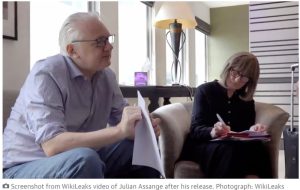Al Anazi, a Saudi Arabian citizen, was arrested in Afghanistan on his recovery bed, following the amputation of his leg, and turned over to US forces by bounty hunters. He was held in Guantánamo from 2002 to 2007, not knowing when or if he would ever be released and with no prospect of a fair trial. Like many of his fellow detainees, al Anazi turned to poetry in order to express his anguish at the injustice of his situation.
The US authorities have long sought to suppress the voices of the individuals they are holding in illegal detention. In the first year of their detention, many of the men in Guantánamo did not have access to pens and paper, so some wrote fragments of poetry on styrofoam cups, passing them from cell to cell.
From 2002, writing materials have been granted to some of the detainees. However, much of the writing is likely to never see the light of day because the US military refuse to declassify it for circulation outside the camp. They have argued that poetry “presents a special risk” to national security because of its “content and format”.
A number of the poems that have been cleared for release have been compiled in a book by the defence lawyer, Marc Falkoff, who has represented 17 Guantánamo detainees. These poems allow the thoughts and feelings of Guantánamo detainees, many of whom remain in the detention camp, to finally be told in their own words.
Find out more about the book and order a copy online.
VIDEO:
Reading poems from Guantánamo (12 December 2007)
Al Anazi, a Saudi Arabian citizen, was arrested in Afghanistan on his recovery bed, following the amputation of his leg, and turned over to US forces by bounty hunters. He was held in Guantánamo from 2002 to 2007, not knowing when or if he would ever be released and with no prospect of a fair trial. Like many of his fellow detainees, al Anazi turned to poetry in order to express his anguish at the injustice of his situation.
The US authorities have long sought to suppress the voices of the individuals they are holding in illegal detention. In the first year of their detention, many of the men in Guantánamo did not have access to pens and paper, so some wrote fragments of poetry on styrofoam cups, passing them from cell to cell.
From 2002, writing materials have been granted to some of the detainees. However, much of the writing is likely to never see the light of day because the US military refuse to declassify it for circulation outside the camp. They have argued that poetry “presents a special risk” to national security because of its “content and format”.
A number of the poems that have been cleared for release have been compiled in a book by the defence lawyer, Marc Falkoff, who has represented 17 Guantánamo detainees. These poems allow the thoughts and feelings of Guantánamo detainees, many of whom remain in the detention camp, to finally be told in their own words.
Find out more about the book and order a copy online.
VIDEO:
Reading poems from Guantánamo (12 December 2007)
“To My Father” by Abdulla Thani Faris al Anazi
Two years have passed in far-away prisons,
Two years my eyes untouched by kohl.
Two years my heart sending out messages
To the homes where my family dwells,
Where lavender cotton sprouts
For grazing herds that leave well fed.
O Flaij, explain to those who visit our home
How I used to live.
I know your thoughts are swirled as in a whirlwind,
When you hear the voice of my anguished soul.
Send sweet peace and greetings to Bu’mair;
Kiss him on his forehead, for he is my father.
Fate has divided us, like the parting of a parent from a newborn.
O Father, this is a prison of injustice.
Its iniquity makes the mountains weep.
I have committed no crime and am guilty of no offense.
Curved claws have I,
But I have been sold like a fattened sheep.
I have no fellows but the Truth.
They told me to confess, but I am guiltless;
My deeds are all honorable and need no apology.
They tempted me to turn away from the lofty summit of integrity,
To exchange this cage for a pleasant life.
By God, if they were to bind my body in chains,
If all Arabs were to sell their faith, I would not sell mine.
I have composed these lines
For the day when your children have grown old.
O God—who governs creation with providence,
Who is one, singular and self-subsisting,
Who brings comfort and happy tidings,
Whom we worship—
Grant serenity to a heart that beats with oppression,
And release this prisoner from the tight bonds of confinement.
Article from Amnesty International mail-out






